5 Symptoms of a Brake Fluid Leak (and Repair Cost)
Brakes are critical for vehicle safety and longevity. A common brake failure is a fluid leak, which can occur in the master cylinder, brake lines, or calipers. A puddle under your car likely indicates a leak, but there are other signs too.
Finding and fixing brake fluid leaks quickly is key, as driving with low fluid can lead to brake failure. Here are 5 common symptoms of a brake fluid leak to help with troubleshooting efforts.
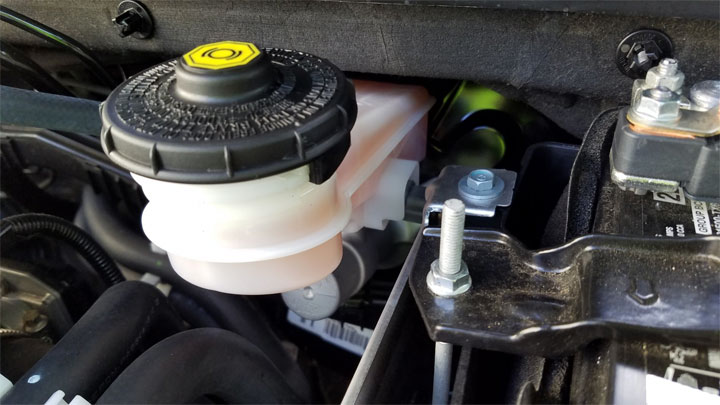
- Symptoms of a leak include a brake warning light, puddles or drips of fluid near the wheels, a squishy or soft brake pedal, the brake pedal going down to the floor, and poor stopping performance.
- Do not continue driving if you experience any of these symptoms and get your vehicle checked out by a mechanic immediately.
- The cost to fix a brake fluid leak depends on the location but will in most cases run $100-$400.
Top 5 Common Brake Fluid Leak Symptoms
#1 – Brake Warning Light On
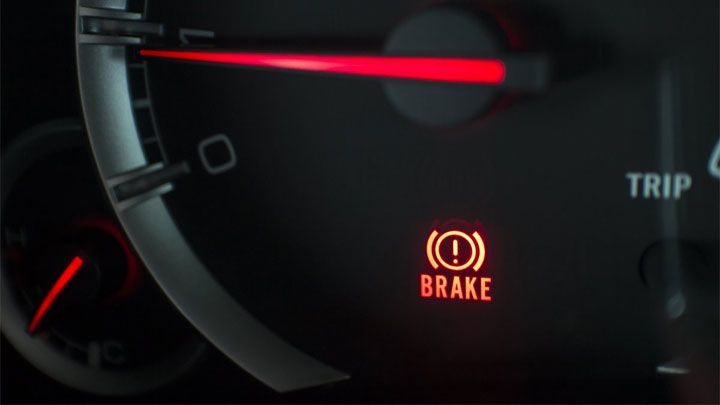
This will usually be the first sign a driver will notice that corresponds to a problem with your brakes since a warning light turning on in your instrument cluster is easily noticeable.
It may not necessarily mean you’re leaking fluid, but as mentioned above, most brake problems are as a direct result of low brake fluid so consider it an early indicator.
See Also: Check Engine Light (Why It’s On and How to Reset)
#2 – Puddle of Brake Fluid
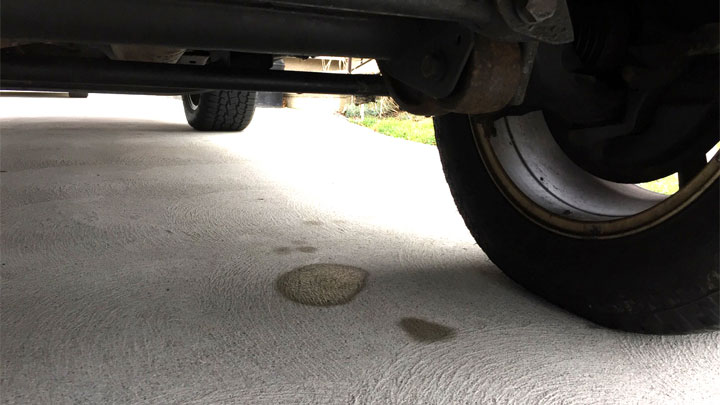
If you notice a small puddle or drips of fluid near the wheels or on the wheels, it’s likely leaking brake fluid. If the brake master cylinder is leaking or the brake lines are, brake fluid will be underneath your car and a bit more difficult to determine whether it’s brake fluid, transmission fluid, or even motor oil.
Brake fluid is light yellow or even clear when new and gradually darkens as it ages. It has a very oily feel (even slicker than oil) and has a rancid smell almost like fish oil. The properties make it fairly easy to confirm that fluid on the ground is in fact brake fluid.
As a final confirmation, check to make sure your brake fluid reservoir is full. If not, you likely have a leak.
#3 – Brake Pedal Feels Squishy
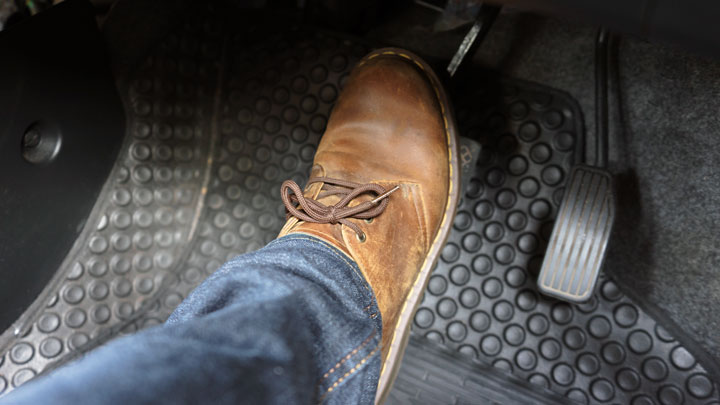
When you push down on the brake pedal to slow down or stop your car, it should feel firm with only a small amount of travel before your brakes are engaged. If instead the brake pedal feels soft, mushy, spongy, or squishy, it’s likely the result of air getting trapped in your brake lines.
Normally, brake lines should be completely full of brake fluid (this is why we “bleed brakes”) to function properly. If there is not enough brake fluid in the system due to a leak, air will enter the brake lines and you could have serious consequences if you need to stop.
#4 – Brake Pedal Goes Down to Floor
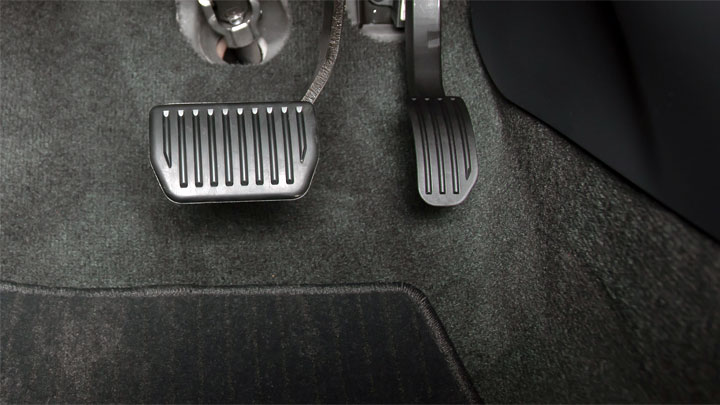
This often occurs alongside your brake pedal feeling soft or squishy. When you have a severe brake fluid leak or problem with the brake master cylinder, you will experience what some call “brake pedal sink“. This simply means there is not enough brake fluid in the lines for the brakes to function.
If you notice this happening before you start driving, do not attempt to drive the car as driving a car without functioning brakes is about at serious as it gets.
If you experience this while driving, immediately force your car to slow down by downshifting gears or even slowly applying the emergency brake and safely get off the road. Do not drive the car until the issue is fixed.
#5 – Poor Stopping Performance
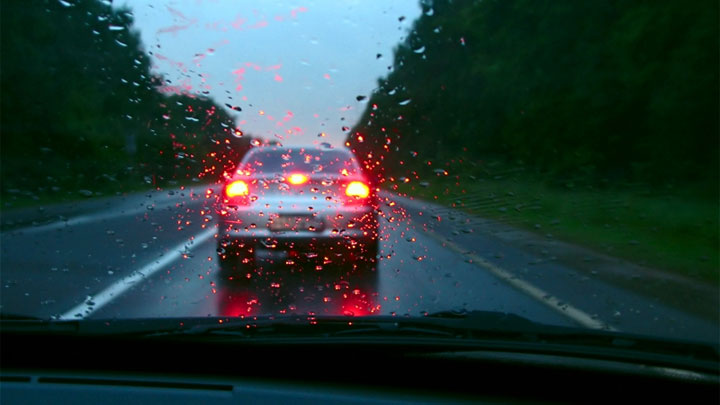
While poor braking performance can be attributed to many issues including issues with brake pads, rotors, calipers, and more, it can also be because of your brake fluid leaking.
Most people will notice one of the above symptoms first but if you feel like something just doesn’t seem right with the way your car brakes, check your brake fluid reservoir at the earliest opportunity. If the reservoir is not full, you likely have a leak somewhere.
No matter which symptom above you experience, you should not continue driving your vehicle until you get it checked out and fixed. Non-functioning brakes are one of the most serious car problems that can occur and are literally life-threatening.
While it’s definitely possible to diagnose and fix a brake fluid leak yourself, this is one of those times you want to contact a mechanic unless you’re 100% sure you know what you’re doing.
Related: Symptoms of a Bad Brake Booster
Brake Fluid Leak Repair Cost
On average, depending on the make and model of car being serviced, the cost of fixing a brake fluid leak isn’t too severe. This is not a repair that is going to set a vehicle owner back very much money when compared to some of the more costly types of automotive repair procedures.
With the average make and model, you can expect the cost of repairing a brake fluid leak to be:
| Type of Leak | Repair Cost |
|---|---|
| Brake Master Cylinder Leak | |
| Repair | Parts = $100-$200 Labor = $80-$140 |
| Replace | Parts = $200-$300 Labor = $40-$80 |
| Brake Line Leak | |
| Repair | $100-$200 |
| Brake Caliper Leak | |
| Repair (one side) | Parts = $100-$200 Labor = $80-$100 |
| Replace (one side) | Parts = $200-$300 Labor = $40-$80 |
| Rear Drum Cylinder Leak | |
| Repair | Parts = $10-$20 Labor = $80-$100 |
| Replace | Parts = $25-$40 Labor = $40-$80 |
However, it is possible to fix the issue by yourself as long has you have sufficient automotive experience and know what you are doing.
For everyone else, hiring a mechanic is going to be the smartest course of action to take to ensure that any and all braking repairs are performed carefully and correctly the first time.
When repairing a leaking brake line, there is no real margin for error because if the brakes do not work, then this is putting a driver (and those around him) in a significant amount of risk.
For anyone in need of pricing, the average brake line repair cost is also noted in the table above.
Causes of Brake Fluid Leaks
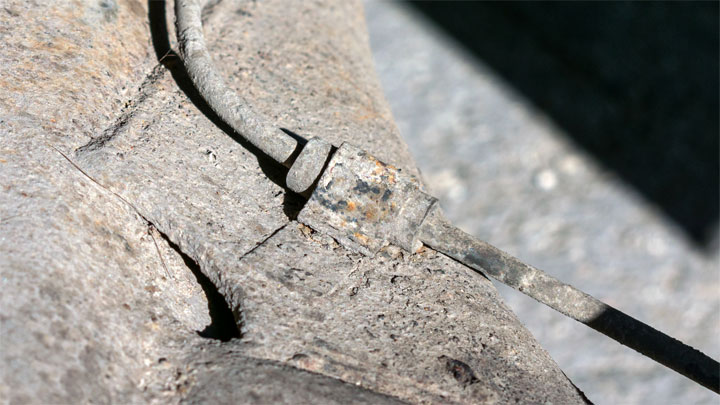
Corrosion and Rust
Your brake lines are prone to corrosion and rusting over time, especially when exposed to moisture, road salts, and temperature fluctuations. This can lead to pitting in your brake lines and, eventually, the formation of leaks.
Regular inspection can help you detect any rusting issues before they cause major problems.
Worn or Damaged Components
Brake fluid leaks can be caused by worn or damaged parts within your brake system. These include the master cylinder, wheel cylinders, calipers, and brake hoses. If any of these components start to wear down or get damaged, they can allow brake fluid to escape your system.
Fittings and Connections
When you have various brake hoses and components connecting together, the connection point or fitting is often the source of the leak. This can include loose or damaged fittings that allow fluid to seep out.
How to Diagnose a Brake Fluid Leak
Brake Master Cylinder Leak
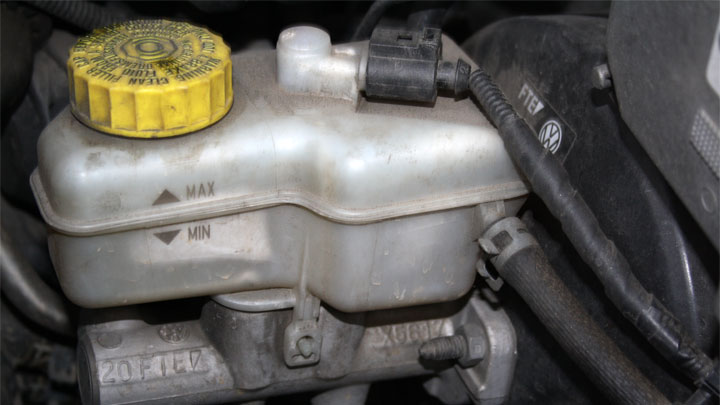
Since this is the easiest to do, a quick visual inspection of the brake master cylinder should be done. Just check the condition on the brake master cylinder area to see if fluid is present on the outside.
Brake Line Leak
Here you’ll need to do a visual inspection under the vehicle chassis to see if there is any brake fluid present on the ground. If there is, then this will confirm the approximate location of a leak.
If there is fluid leaking, it would be wise to then prevent the fluid from getting everywhere by laying some newspaper down on the ground underneath the car. Better yet, garage floor mats exist for this very purpose. They are the the ideal way to contain a brake fluid leak, or any type of fluid leak coming from your car.
To confirm the location of the leak, you’ll want to get in the car and pump the brake pedal to force any remaining brake fluid out. After that, it will be safe to get under the car again to pinpoint the exact leak location. Once the leak is found, the brake line can either be repaired or replaced.
Brake Caliper Leak (or Rear Drum Cylinder)
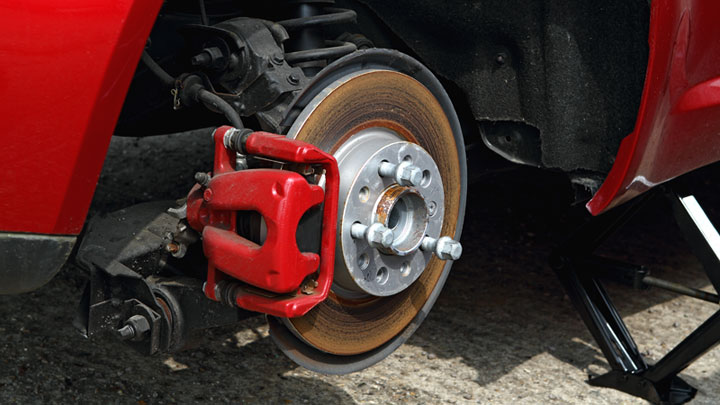
Inspecting Brake Caliper or Rear Drum Cylinder: In this step, you must open each tire to check the leak at each caliper. If inspecting the rear brake using brake drum, you should open the drum to check the drum cylinder inside the brake drum.
Differentiating Brake Fluid Leaks vs Other Leaks
Knowing when you have a brake fluid leak as opposed to another type of leak is crucial. Here’s how to tell the difference between brake fluid and other common types of car fluids.
Transmission Fluid
Unlike brake fluid, which appears clear or light brown when it’s new and gets darker as it ages, transmission fluid typically maintains its reddish or reddish-brown color unless it becomes burnt.
In addition, the location of the leak can also provide valuable information. Transmission fluid leaks occur near the transmission, often near the front of the vehicle, while brake fluid leaks are typically more centralized or near the wheels.
Motor Oil
Much like transmission fluid, motor oil has a distinct color that separates it from brake fluid. Motor oil is generally golden, dark brown, or almost black, depending on its age and condition.
Engine oil also has a thicker consistency than brake fluid, making it easier to identify when examining the leak. Leak location also plays a role. If you spot a leak near the engine or oil pan, it’s most likely motor oil.
Condensation
While you wouldn’t think it would be possible to confuse water condensation with brake fluid, it can happen. You will often notice it dripping from your vehicle’s air conditioning system or exhaust pipe, especially during humid weather conditions.
Condensation is generally clear and odorless, unlike brake fluid, which has a unique chemical smell. Also, brake fluid feels slippery to touch, while water from condensation does not.
- Replace the Engine or Replace the Car? (11 Factors to Consider) - Apr 11, 2024
- Plastic Piece Dragging Under Your Car? (What It Is and What To Do) - Mar 21, 2024
- Timing Belt vs Timing Chain (What’s the Difference?) - Feb 27, 2024

Thanks, happened to my car where there drips of yellowish fluid on the left hand side front wheel. Thought it was the the transmission O ring leakage. Well, 8 yrs old car getting sick here and there and frequent visits to the mechanics.
super idea given to me
thanks lot of
brake oil tank leak identify easier
thanks